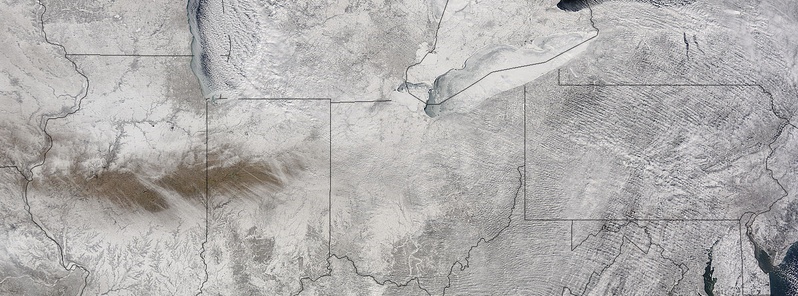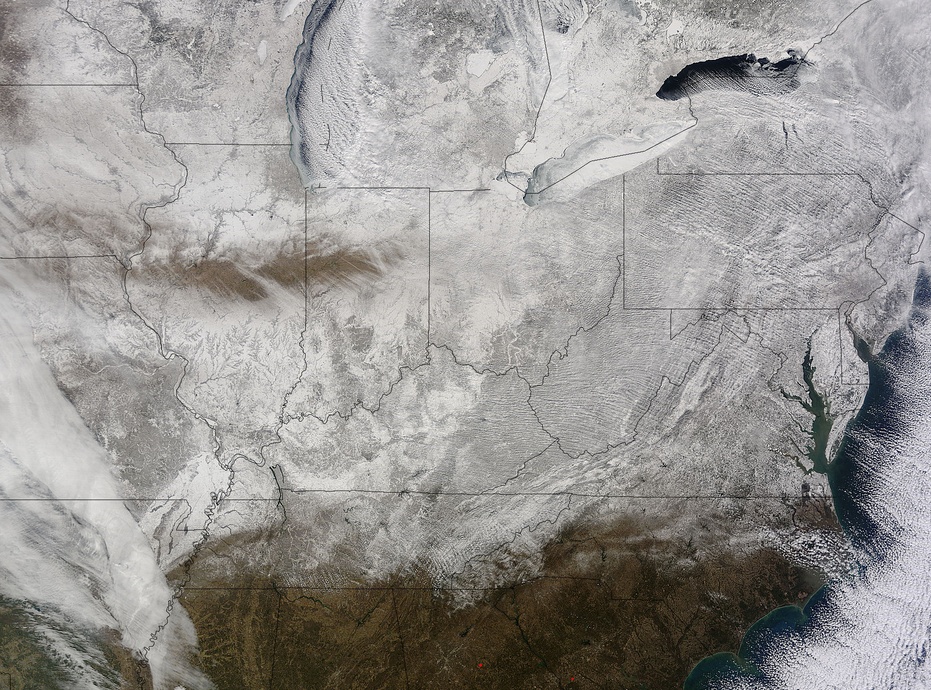Arctic and Siberian air masses trigger hundreds of record lows in eastern US

In addition to snow cover, Arctic and Siberian air masses have settled in over the eastern US triggering many record low temperatures in many states last week.
On the morning of February 20, NOAA's Weather Prediction Center (WPC) noted, "There were widespread subzero overnight lows Thursday night (February 19) extending from Illinois to western Virginia, and numerous record lows were set. Bitterly-cold arctic air is setting numerous temperature records across the eastern US and will keep temperatures well below normal on Friday (February 20)."
In Baltimore, Maryland, a low temperature of 1F broke the record low for coldest morning recorded at the Thurgood Marshall Baltimore Washington-International Airport, Dr. Tony Phillips of Science@NASA writes.
In North Carolina, a record low temperature was set at Charlotte where the overnight temperature bottomed out at 7F breaking the old record of 13F in 1896.
In Asheville, temperatures dropped to just 4F breaking the old record of 10F in 1979. Temperature records for Asheville extend back to 1876.
In Louisville, Kentucky, temperatures dropped to -6F, breaking the old record low of 0F, according to meteorologist Brian Goode of WAVE-TV.
Meanwhile, Richmond Kentucky bottomed out at a frigid -32F.
Several records were also broken in Georgia, according to Matt Daniel, a meteorologist at WMAZ-TV, Macon Georgia, who cited data from the National Weather Service. Daniel said that Macon set a new record low when the temperature dropped to 18F, beating the previous record of 21F set in 1958. Athens broke a new record low too dropping to 14F and beating the old record of 18F set in 1958/1928.

On February 19 at 16:40 UTC, the Moderate Resolution Imaging Spectroradiometer (MODIS) instrument that flies aboard NASA's Terra satellite captured a picture of the snowy landscape. The snow cover combined with the frosty air mass made the eastern U.S. feel like the inside of freezer. The MODIS image was created at NASA's Goddard Space Flight Center in Greenbelt, Maryland.
Lynchburg, Virginia, plummeted to 11 below zero Friday morning (February 20), setting a new all-time record low for any day of the year, The Weather Channel writes. The previous record was 10 below zero on January 21, 1985, and February 5, 1996.
Flint, Michigan, tied its all-time record low of 25 below zero, originally set January 18, 1976.
Earlier last week Erie, Pennsylvania, had tied its all-time record low when it reached 18 below zero Monday (February 16). That tied the record set January 19, 1994. Not far away, Jamestown, New York, set an all-time record low of 31 below zero Tuesday, though its records only go back to 1960.
At least 72 daily record lows were set Friday morning from Connecticut to Florida to as far west as Indiana, including major cities such as New York, Baltimore, Washington, Pittsburgh, Atlanta, Charlotte, Miami, Detroit and Cincinnati.
According to NOAA's National Climatic Data Center (NCDC), 647 record lows were tied or broken Sunday through Thursday (February 16 – 19). This figure includes not only major airport reporting stations, but also smaller cooperative observation sites in rural areas.
Featured image: NASA Terra/MODIS on February 19, 2015.

thank you UN climate panel for having yearly meetings to tell us are climate is changing. You should tax are energy put smart meters in our homes to tell us when its the right time to use energy. In the future you will also tax us by the mile when we drive so we can win this fight in climate change! I’m so glad the science is settled once in for all. The world will be a happier place for it now.
best wishes
A
It is strange that the warming crowd who claim to know what the climate will be for many decades hence did not predict this?